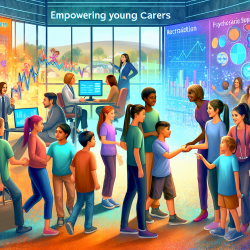Introduction
In the evolving landscape of healthcare, the integration of research findings into practice is crucial for enhancing service delivery and outcomes. This blog post explores the insights gained from the research article titled "The Aging, Community and Health Research Unit—Community Partnership Program for older adults with type 2 diabetes and multiple chronic conditions: a feasibility study" and discusses how practitioners, especially those involved in online therapy services like TinyEYE, can leverage these findings to improve their practice.
Research Overview
The study in question evaluated the feasibility of a nurse-led, community-based program aimed at promoting diabetes self-management among older adults with type 2 diabetes and multiple chronic conditions (MCC). The program's primary goal was to assess the feasibility of implementation and study methods, alongside exploring potential improvements in self-management behavior and health status over a six-month period.
Key Findings and Their Implications
The study revealed several critical insights that can be adapted to enhance online therapy services:
- Feasibility and Acceptability: The program was deemed feasible and acceptable by both participants and providers, indicating that similar structured programs could be successfully implemented in online settings.
- Interprofessional Collaboration: The nurse-led model emphasized the importance of interprofessional collaboration, a principle that can be mirrored in online therapy by integrating various specialists to provide comprehensive care.
- Client-Centered Approach: Tailoring interventions to meet individual needs was a significant factor in the program's success. Online therapy platforms can enhance client outcomes by customizing therapy sessions based on individual assessments.
Implementing Research Insights in Online Therapy
For practitioners at TinyEYE and similar organizations, incorporating these findings into practice can lead to significant improvements in service delivery and client outcomes:
- Structured Programs: Develop structured, evidence-based programs that are adaptable to the online environment, ensuring they are both feasible and acceptable to clients.
- Collaboration Across Disciplines: Foster a collaborative environment where speech-language pathologists, psychologists, and other specialists work together to address the multifaceted needs of clients.
- Customization and Flexibility: Use data-driven insights to tailor therapy sessions, ensuring they are aligned with the specific needs and goals of each client.
Encouraging Further Research
While the feasibility study provides a solid foundation, further research is essential to refine and validate these approaches in the context of online therapy. Practitioners are encouraged to engage in ongoing research efforts, contributing to a growing body of evidence that supports innovative therapy models.
Conclusion
By implementing the insights from this research, practitioners can enhance the quality and effectiveness of online therapy services. As the field continues to evolve, staying informed and adapting to new evidence will be key to achieving the best outcomes for clients.
To read the original research paper, please follow this link: The Aging, Community and Health Research Unit—Community Partnership Program for older adults with type 2 diabetes and multiple chronic conditions: a feasibility study.










